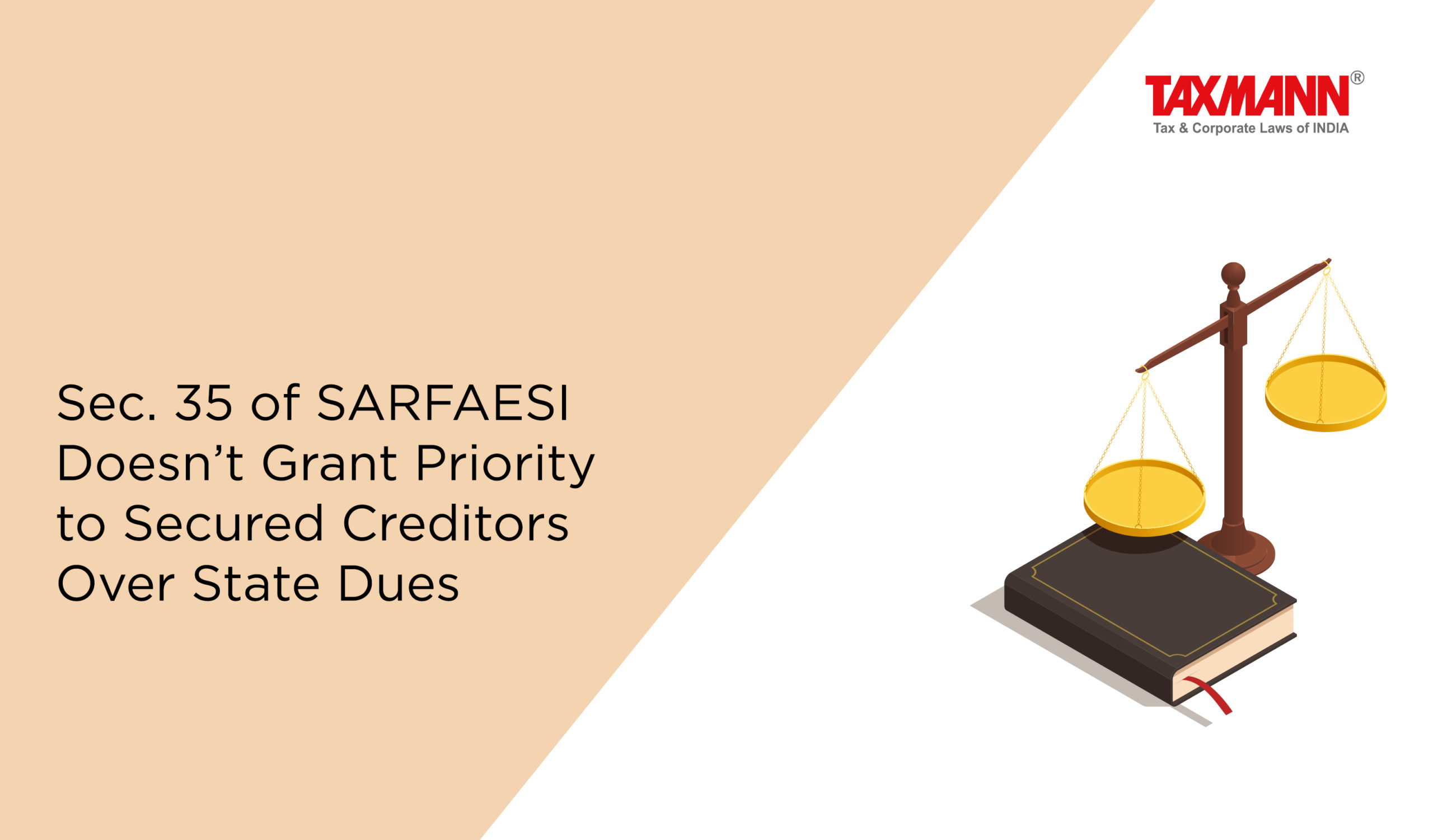Sec. 35 of SARFAESI Doesn’t Grant Priority to Secured Creditors Over State Dues
- Blog|News|FEMA & Banking|
- 3 Min Read
- By Taxmann
- |
- Last Updated on 5 August, 2023

Case Details: State of Himachal Pradesh v. A. J. Infrastructures (P.) Ltd. - [2023] 152 taxmann.com 365 (SC)
Judiciary and Counsel Details
-
- S. Ravindra Bhat & Dipankar Datta, JJ.
- Abhinav Mukerji, A.A.G., Mrs Bihu Sharma, Ms Pratishtha Vij, Akshay Shrivastava, Advs., Abhinav Mukerji & Varinder Kumar Sharma, AORs for the Appellant.
- Arunabh Chowdhury, Sr. Adv., Aman Preet Singh Rahi, Adv., A. Venayagam Balan, AOR, Puneet Thakur, Gaurav Pal, Advs., Sanjay Kapur, AOR, Ms Megha Karnwal, Surya Prakash, Arjun Bhatia, Lalit Rajput, Devesh Dubey & Ms Mahima Kapur, Advs. for the Respondent.
- Deepak Kaushal, Adv. for the Petitioner.
- M.S Chandel, Adv. General, J.K Verma, Dy. Adv. General, G.C Gupta, Sr. Adv. & Mahinder Gautam, Adv. for the Respondent.
Facts of the Case
In the instant case, the first respondent purchased the subject property in an auction conducted by the State Bank on 18-1-2005 in the exercise of the power conferred by the ‘SARFAESI Act’. The subject property was initially mortgaged on 11-10-1999 with HPFC by Regent. Due to a breach committed by Regent, HPFC took over the property and sold the same to Eastman, which subsequently mortgaged it with the State Bank.
Eastman too committed default and, therefore, the property was put up for sale in an auction under the Act in which the first respondent purchased the same. The first respondent applied for mutation of property in its name. However, an application was rejected on the ground that on asking of Excise and Taxation Officer, entries in red ink had been made by Tehsildar, pertaining to the demand of arrears of tax payable by Regent and Eastman under the provisions of Himachal Pradesh General Sales Tax Act.
On writ, the High Court allowed a writ petition holding that provisions of section 35 of the SARFAESI Act, 2002 would override the inconsistent provisions of section 16B of the HP General Sales-tax Act. This led to the only conclusion that there was no prior charge on the property except for that of the bank with whom the property was mortgaged.
The Supreme Court, while considering the decision of Central Bank of India v. State of Kerala [2009] 4 SCC 94, observed that section 35 of the SARFAESI Act, 2002 cannot be construed as conferring any right on a secured creditor to claim priority over the dues of the State in absence of a provision in that behalf, which presently can now be claimed, subject to other conditions being fulfilled, in view of section 26E.
Further, it was noted that section 16B of the HP General Sales Tax Act would be attracted only after the determination of liability and when a sum becomes due and payable; and it is only thereafter that charge, if any, would operate.
Supreme Court Held
The Supreme Court held that no relevant documentary evidence had been placed to show that there was a determination of liability, the question of taking recourse to the Himachal Pradesh Land Revenue Act for recovery of dues as land revenue did not arise.
The Supreme Court, further held that without such determination of liability, no red entry marks could have been inserted in revenue records and the High Court was right in holding that State ought not to have refused mutation.
List of Cases Reviewed
-
- A.J. Infrastructures v. State of HP [2023] 152 taxmann.com 364 (HP) (para 49) affirmed [See Annex]
- Central Bank of India v. State of Kerala [2009] 4 SCC 94 (para 38) followed.
- A.J. Infrastructures v. State of HP [2023] 152 taxmann.com 364 (HP) (para 32) reversed. [See Annex]
- Central Bank of India v. State of Kerala [2009] 4 SCC 94 (para 40) followed.
List of Cases Referred to
-
- State Bank of Bikaner & Jaipur v. National Iron & Steel Rolling Corporation 1995 taxmann.com 740 (SC) (para 11)
- A.R. Antulay v. R.S. Nayak [1988] 2 SCC 602 (para 27)
- Central Bank of India v. State of Kerala [2009] 4 SCC 94 (para 36).
Disclaimer: The content/information published on the website is only for general information of the user and shall not be construed as legal advice. While the Taxmann has exercised reasonable efforts to ensure the veracity of information/content published, Taxmann shall be under no liability in any manner whatsoever for incorrect information, if any.

Taxmann Publications has a dedicated in-house Research & Editorial Team. This team consists of a team of Chartered Accountants, Company Secretaries, and Lawyers. This team works under the guidance and supervision of editor-in-chief Mr Rakesh Bhargava.
The Research and Editorial Team is responsible for developing reliable and accurate content for the readers. The team follows the six-sigma approach to achieve the benchmark of zero error in its publications and research platforms. The team ensures that the following publication guidelines are thoroughly followed while developing the content:
- The statutory material is obtained only from the authorized and reliable sources
- All the latest developments in the judicial and legislative fields are covered
- Prepare the analytical write-ups on current, controversial, and important issues to help the readers to understand the concept and its implications
- Every content published by Taxmann is complete, accurate and lucid
- All evidence-based statements are supported with proper reference to Section, Circular No., Notification No. or citations
- The golden rules of grammar, style and consistency are thoroughly followed
- Font and size that’s easy to read and remain consistent across all imprint and digital publications are applied



 CA | CS | CMA
CA | CS | CMA
